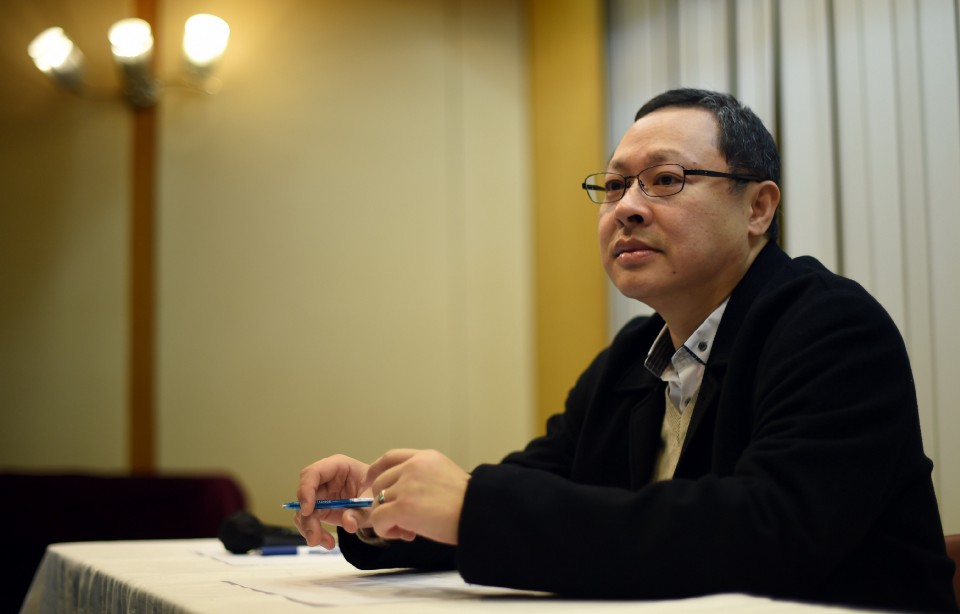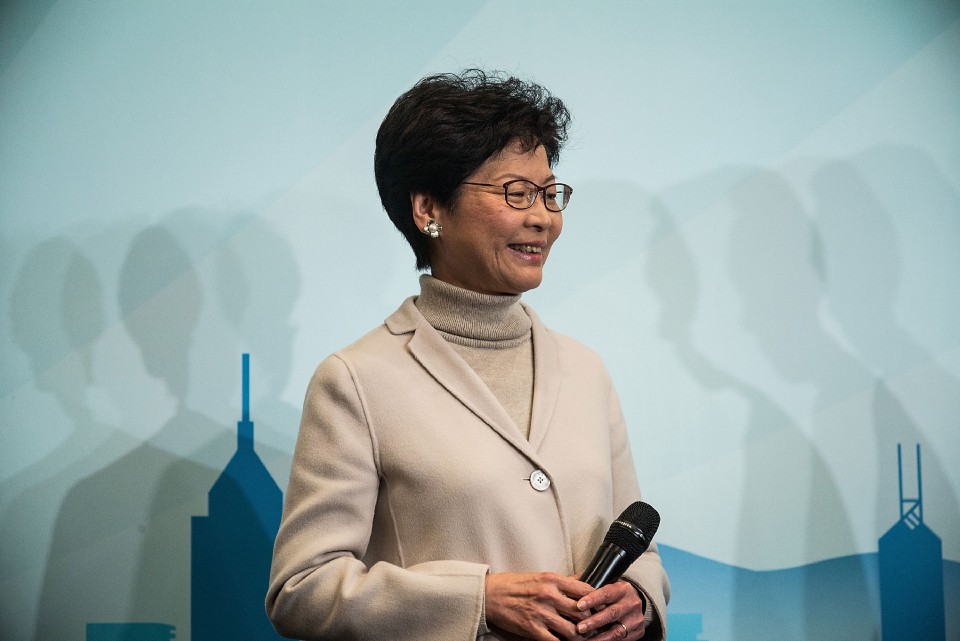First they came for the democracy activists. Or so it seemed in Hong Kong this week.
On Sunday, Carrie Lam Cheng Yuet-ngor, widely seen as the Beijing establishment’s preferred candidate, was picked to be Hong Kong’s leader by an electoral committee. Her selection comes as a major defeat for those fighting for universal suffrage for Hong Kong, the former British colony that has — since its return to Chinese rule — enjoyed a greater degree of political freedom than the rest of China. Her inauguration is scheduled for July 1st.
The following day, a group of nine leaders of the Hong Kong Occupy movement — the same group of activists who in 2014 shut down city streets in the Asian economic hub as a means of advocating for universal suffrage for Hong Kongers — was charged with a series of crimes including inciting “public nuisance.” They were arrested and released hours later.
Rights activists are disturbed by Lam’s selection for Hong Kong’s top office of chief executive, and are hurriedly working to inspire supporters to mount a long-lasting fight for suffrage in Hong Kong and beyond. The implications of these events are far-reaching. Hong Kong, before its handover in 1997, was intended by Chinese leaders in Beijing as an incubator for Chinese democracy. The events of the last few days bear great consequence, not just for the city, but the Greater China Region.
Pacific Standard spoke to Chan Kin-man, one of the Occupy movement organizers, hours after his release on Monday.
“The timing and charges are extremely unusual,” he says. “It seems that authorities were worried the prosecution might invite backlash from the community and thus waited until the election was over.”
Chan is among three of the arrested now facing a maximum prison sentence of 21 years.
“I am sure the government [is trying] to create a chilling effect [for the] opposition,” adds Chan, who is also a sociology professor at the Chinese University of Hong Kong.
A spokesperson for Hong Kong’s Department of Justice (DOJ) aimed to illuminate some of the legal considerations behind the charges.
“Such action is based purely on legal considerations as well as considerations relating to law enforcement. As the relevant judicial procedures are about to commence, it is not appropriate for the DOJ to make further specific comments,” the spokesperson told Pacific Standard via email, adding that the cases would be handled according to the Hong Kong constitution “in an impartial, professional, and apolitical manner, and free from any interference.”


Chan and other key Occupy figures are expected to appear again in court today, according to Hong Kong’s leading English-language newspaper South China Morning Post. The scheduled appearance was confirmed to Pacific Standard by Demosistō, a political party started in April of 2016.
Joshua Wong Chi-fung, the 20-year-old co-founder of Demosistō, was among the more prominent faces of that movement.
“There are times when we may feel depressed or hopeless, but I do wish that those who believe in equal political representation will not give up on Hong Kong over the next five years,” Wong says.
Wong was not among the leaders charged. He was convicted in July for unlawful trespassing on government property during the 2014 protests. He and his fellow activists said the trial amounted to a thinly veiled attempt to silence dissent. Wong was sentenced to community service, but did not do time in prison. In October, Wong was detained at a Bangkok airport. His detention and removal from the country had reportedly been at Beijing’s behest. Thailand has been among the Southeast Asian countries to support China in its struggle with Vietnam, the Philippines, and others over the South China Sea.
For Wong, Lam’s appointment underlines the daunting nature of the task before him and other Hong Kong rights activists.
“‘Elected’ by 0.03 percent of the Hong Kong people in a non-representative process.”
Wong had fought with Chan and others for a democratic election; instead, Lam was chosen by 777 members of a 1,194-person selection committee that Wong and others argue is comprised of a disproportionate number of pro-Beijing members. “This reflects the reality that the Chinese Communist Party is able to completely control Hong Kong’s election, crushing the dreams of our more hopeful allies and signaling a low point in our democracy movement,” he says. “The difficulty of our struggle can not be overstated, given that we are facing the world’s largest and strongest authoritarian regime. It is the Chinese president more so than the Hong Kong chief executive who actually decides our fate.”
Others agree that, despite the low point, the fight for representative government must continue.
“‘Elected’ by 0.03 percent of the Hong Kong people in a non-representative process, the chief executive must still be held accountable to the Hong Kong people and protecting Hong Kong’s future,” writes Sharon Hom, director of Human Rights in China, a non-governmental organization based in New York and Hong Kong, via email.
Much as American courts have overturned multiple attempts at a travel ban that judges ruled disproportionately affected Muslims, Hom places her hopes for Hong Kong democracy in the judicial system.
“Hong Kong courts must reject the misuse of criminal prosecution to target and punish critical civil society views, or as a political tool to remove democratically elected LegCo members,” she says, referring to Hong Kong’s legislative council, the city’s lawmaking body. “The courts must stand firm for the protection of the lawful exercise of the rights to freedom of expression, association, and assembly, including the rights to criticize authorities and offer alternative views.”
In the agreement under which Britain reverted control of Hong Kong back to China, then-Chinese Chairman Deng Xiaoping promised the city 50 years of “a high degree of autonomy.” That pledge is referred to as “One Country, Two Systems.”
Analysts have argued that Deng had hoped Hong Kong’s comparative freedoms would influence the direction of Beijing’s central government, but it appears that Hong Kong is now being reined in by Beijing.
“The challenges to protecting one country, two systems — especially the rule of law and Hong Kong core values — are now severely worsened by the selection of a chief executive clearly willing to carry out Beijing’s bidding,” Hom says.
Hom warned against Lam ignoring the will of pro-democracy Hong Kongers.
“To avoid exacerbating even greater instability and division, the new chief executive must commit to a more inclusive political consultation process and demonstrate that she will respond to the serious concerns of the Hong Kong people,” she says. “At the end of the day, it will still be Hong Kong’s people who will determine the future of Hong Kong.”
Wong, for his part, pledges to continue to organize, even as organizers continue to come under fire.
“We are prepared to demonstrate our obligation to Hong Kong on various fronts — the local community, the streets, the legislature, and the international level,” he says.





